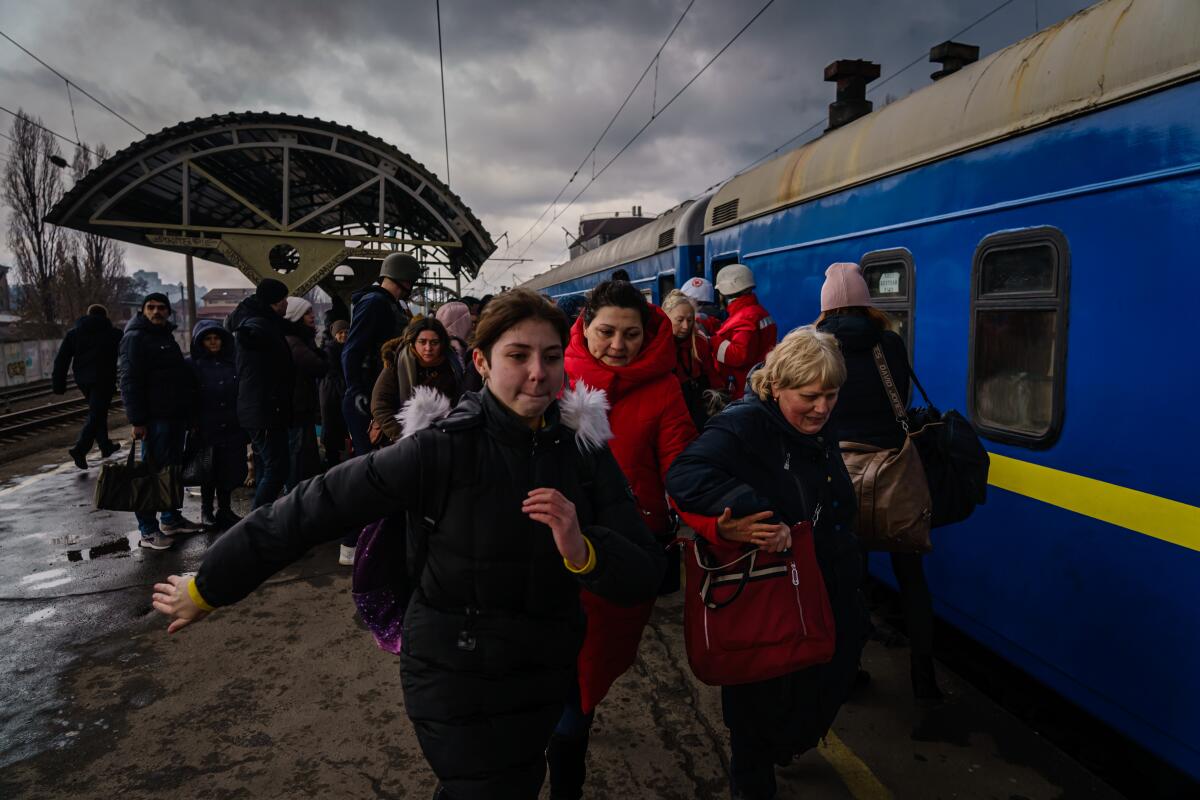Letters to the Editor: Is there a racist double standard in the Western media’s coverage of Ukraine?

- Share via
To the editor: I agree with columnist Lorraine Ali that her fellow journalists are wrong to call the war in Ukraine the “most important in our lifetime.” However, in focusing on the slights to those who endured recent wars in the Middle East, she ignores the greater slight to those who lived through World War II.
Plenty of them are still among us, but perhaps she considers them too old to matter.
The current war is certainly the most important in this century, for reasons that have nothing to do with race but far more to do with Russian President Vladimir Putin and Chinese President Xi Jinping standing side by side proclaiming a new world order.
We are on the brink of World War III, and if it comes every race and country will suffer the consequences.
Kathleen Barreto, Culver City
..
To the editor: My thanks to Ali for her commentary, which truly reflected my thoughts in light of never-ending news coverage about this war.
While I’m distraught about the terrible plight of the Ukrainian people, I’m equally distressed over the wars and conflicts occurring in nonwhite countries throughout the world. However, those battles get minimal coverage, and that’s very disappointing to me as an African American woman.
Unfortunately, I’m not surprised, because it’s clear that the decision-makers in newsrooms are overwhelmingly white men with little interest in, contact with or appreciation of people of color.
Cora Jackson-Fossett, Los Angeles
..
To the editor: I congratulate The Times for prominently publishing the column by Ali, which expresses something that has disturbed me and my friends over the past week.
The tragedy taking place in Ukraine is terrible but no worse than what happened in Syria, Iraq, Afghanistan, Yugoslavia and elsewhere in past years.
I guess it is human nature to feel most empathy for those who most resemble us, but we need to be reminded that our perspectives are limited. When articles like Ali’s prompt us to expand our vision, perhaps we will be more determined to end war everywhere.
Katherine King, Venice
..
To the editor: Perhaps we are so gripped by coverage of Russia’s invasion of Ukraine because not just the victims of this war of aggression “look like us.” The aggressors do too.
After the brutal European conflicts of the 20th century, we like to think we are past all that — that we just don’t do that sort of thing.
But we do. And that’s what makes it very, very scary.
Sandra Genis, Costa Mesa
..
To the editor: Ali’s piece is an insult, and the placing on your print edition’s front page makes it even worse.
Along with millions of other European Americans, I have agonized and grieved over the Taliban’s return to power and and the plight of Muslims in China and Myanmar. They are fellow human beings who are suffering.
The tragedy of Ukraine is compounded because it reminds us that the most destructive war in history was in Europe, notably including Ukraine. We wished for better times. That does not make us bigots.
Shame on The Times for constantly seeking to stir the ashes of resentment.
Glenn Pascall, Dana Point
..
To the editor: Ali’s commentary on the “racist double standard in war coverage” helped to coalesce my thoughts concerning the current war coverage in Ukraine.
One wonders what the coverage of the invasion of Iraq would have been like if done from the perspective of the victims of the American campaign of “shock and awe,” when when an estimated 7,000 Iraqi civilians were killed in a period of two months.
Carl Fonseca, Artesia





